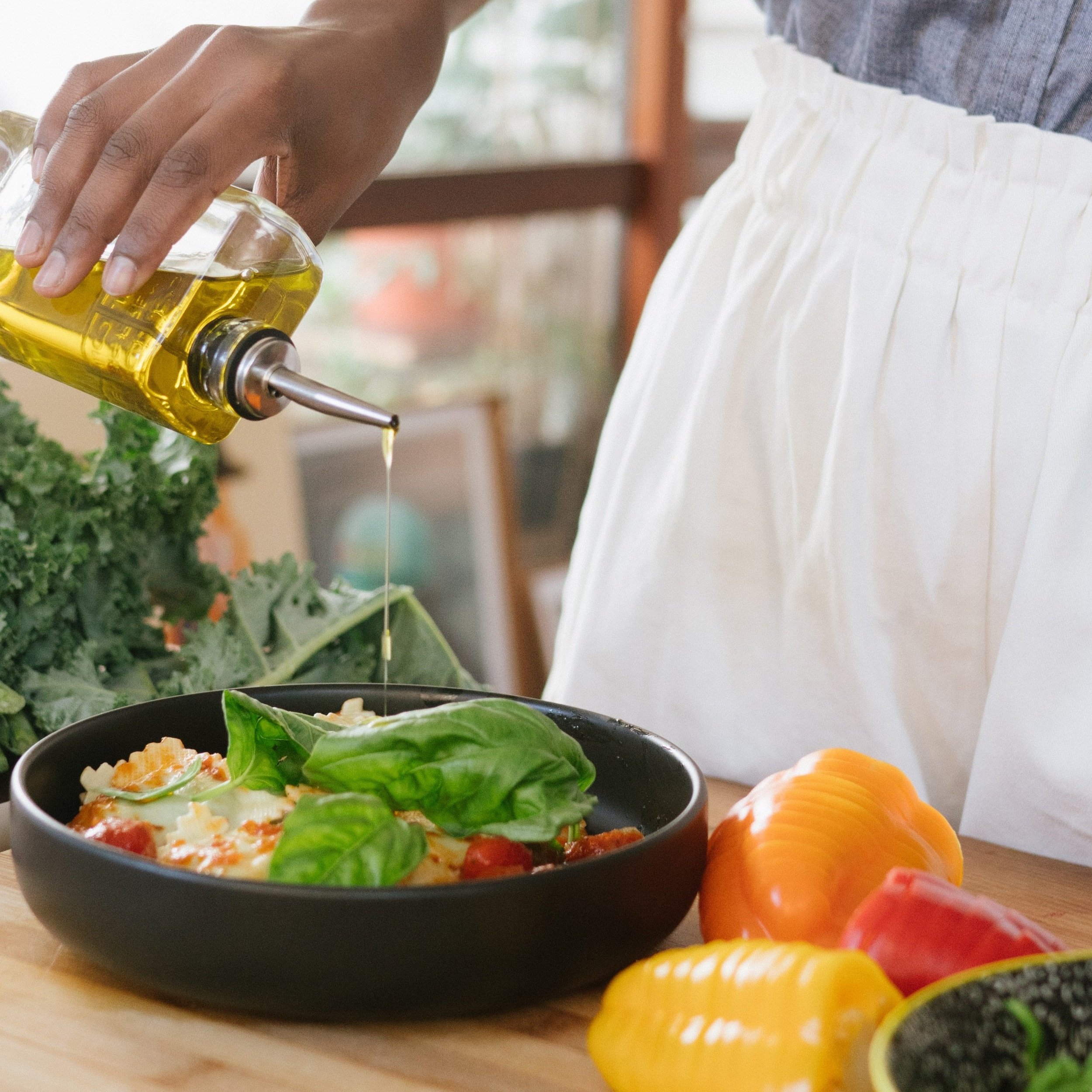Healthiest Oils for Cooking and What to Avoid
If you’re trying to loose weight, you’ve probably thought about cutting back on the oils and fats within your diet. But when it comes to nutrition, not all fats are bad. In reality, there are many fats that are beneficial and really important for a healthy and balanced diet.
The problem is, it’s not easy knowing which oils you should be using. And there’s also the question of how to use each specific oil within your meal prep. So, if you’re not sure what you should be choosing, here’s a quick guide...
WHY THE BODY NEEDS FAT FROM FOOD
A lot of people worry that consuming fat will make them fat. But it’s not actually the fat in our diets that makes us gain weight. Weight gain comes from consuming more calories than you need. So to be your healthiest self, you need to focus on a nutrient-rich, fat-friendly, balanced diet.
Our bodies need fat to survive. Fats provide nutrients that are essential for things like growth, energy, organ function, metabolism and hormone health. Not to mention giving us healthy skin and hair!
Our brains are also two-thirds fat, and our cell membranes are made of essential fatty acids. Because of this, we need to have enough quality fat in our diet to support brain health and our body’s overall wellbeing.
CHOOSING THE RIGHT FATS FOR YOUR BODY
The healthiest diet will always include enough fat to help your body thrive! But it’s important that you eat fats in moderation and you also consume the right kinds of fat.
In particular, you want to focus on omega-3 fats, which support the health of our cell walls and help our body to cool off inflammation.
Over-consuming omega-6 and under-eating omega-3 fats can create a huge imbalance in the body. And if you don’t have the right balance, you put yourself at risk of inflammation, cancer and heart disease.
HEALTHIEST OILS FOR COOKING:
There’s a lot of misconceptions about which oils and fats are the healthiest. For years, we’ve been told to stay away from saturated fat and only consume processed vegetable oils. But in fact, this isn’t always the case!
Omega-6, for example, which is found in oils such as sunflower, safflower and soybean can help protect your heart and control cholesterol levels when consumed in healthy amounts. But – continuous, high intake of these fats actually weakens the body and increases your risk of disease!
So what fats are better and what should we be using in our cooking instead? Here are some of my favourites:
AVOCADO OIL
Avocados are full of healthy fats, vitamins, minerals and phytonutrients, which makes this oil an amazing option to have at home. Avocado oil is a natural anti-inflammatory, it also helps stabilise blood sugar and is great for supporting heart health. Avocado oil is best used in salads and dressings if you want to preserve all the nutrients, but it’s safe to cook with, too.
EXTRA-VIRGIN OLIVE OIL
100% pure, high-quality olive oil should be a kitchen staple! Extra-virgin olive oil contains lots of protective antioxidants such as polyphenols, which means it can be used for low heat cooking and is also great in salads!
COCONUT OIL
If eaten in moderation, coconut oil is a great, healthy choice to cook with. Extra-virgin, cold-pressed coconut oil raises HDL (the good cholesterol), and it also contains a unique type of saturated fat called MCT which boosts metabolism, reverses insulin resistance and improves cognitive function. It’s also high in lauric acid which is great for immune function.
GRASS-FED BUTTER OR GHEE
Despite what people say – butter and ghee are good for you! Organic, grass-fed butter is high in vitamins, as well as omega-3 fats and butyric acid which can boost immunity, help inflammation and protect against some forms of cancer. Butter and ghee are also filled with essential fatty acids that are great for your heart health. Plus, if you’re lactose intolerant, ghee could be a suitable option for you.
COOKING OILS TO AVOID!
As you can see - fats definitely aren’t created equal! Many oils that are processed, genetically modified or contain trans fat can cause serious health problems and disease.
For example, margarine is filled with trans fat – which is the most deadly fat in our food supply! While oils such as soy, corn, canola (rapeseed) and cottonseed are all GMO, inflammatory and sometimes use toxic solvents in their processing.
If you want to stay healthy, it’s important to avoid cooking unsaturated fats like these, too, as the heat releases a chemical compound that can negatively affect your heart and increase your risk of cancer.
KEEPING IT BALANCED
As with anything, the best diets are all about moderation. Even the healthiest oils can be bad for you if you’re not taking good care of your body.
So, just because an oil is considered healthy, it doesn’t mean you should have a huge amount of it every day! Oils are still high in calories and can raise your cholesterol if you don’t consume them as part of a healthy and balanced diet.
I’d love to hear from you - What oils do you love to cook with? Have you noticed a difference in your wellbeing since making the shift? Let me know your thoughts in the comments below!
If you want more advice or personal support, Get in Touch!

